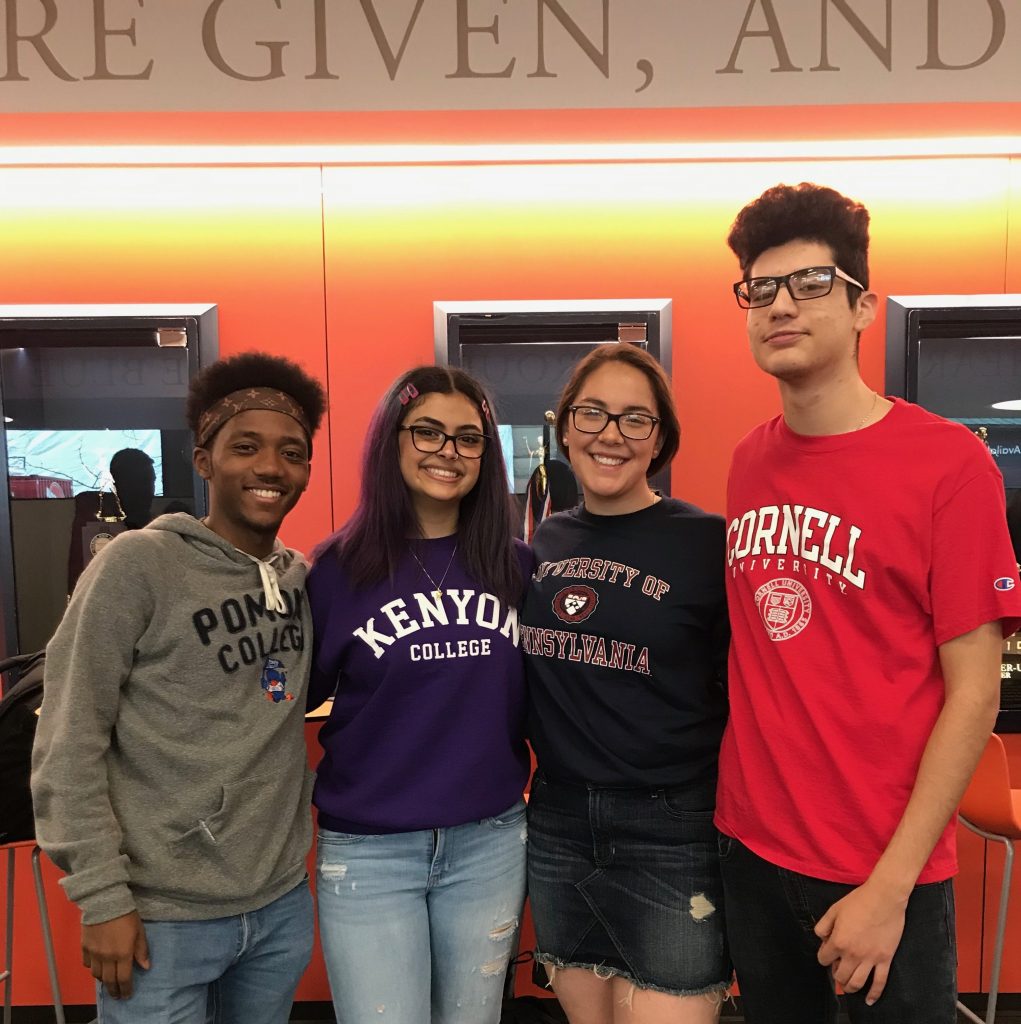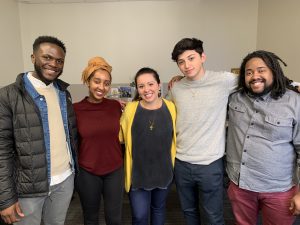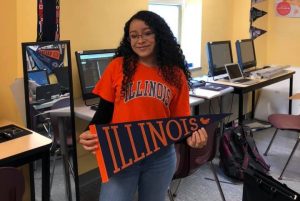
Interview with BestColleges: How to Support First-Generation Students
Originally posted on BestColleges on May 1, 2019
Can you define what “first-generation student” means to you? What makes them unique, aside from family history?
A first-generation student is someone who has overcome the barriers set up by economics, prejudice, and disenfranchisement to complete a level of education that hasn’t been completed by those before them. They are not necessarily the first people to try to reach these levels of education nor are they the only ones who can. What makes these students unique is that they have been able to access and utilize the resources and support needed to persist in their education. First-generation students are young and old, elementary school graduates, high schoolers, and college graduates, kids, parents, workers, etc.
How does a first-generation student’s approach to education differ than their legacy counterparts?
A first-generation student often has to overcome two main barriers to complete their education: access and persistence. Many legacy students are guaranteed access to a higher education since they have families with access to economic resources, social capital, and clout. For them, admission to college isn’t necessarily the issue, the issue is usually where. For first-generation students that widely lack economic resources and social capital, the issue is how. How do I apply to college? How do I pay for college? How good do I have to be to go college?A first-generation student is faced with many more questions than their counterparts because access is not guaranteed. This becomes a further issue when it comes to college persistence. How do I reapply for financial aid? How do I travel to campus every year? How do I pick a major that will get me job with enough pay to help my family? Faced with more questions and few answers from previous generations that did not complete that level of education, first-generation students are tasked with navigating a new academic world. And they do so often alone. Because of all these differences, first-generation students are more resilient and diligent in their approach to education, because to them, the stakes are too high.
Why is it important for first-generation students to attend college?
A college education has become a vital necessity in a job market where the high school diploma is no longer the minimum expectation. Many jobs require that an applicant have at least a Bachelor’s degree and still many require that applicants have at least a Master’s degree. By the mid-2020s, when most of the current high school students will graduate college, there will be more STEM-related jobs than ever that require deep knowledge of technology, computer science, and medicine. These students will need college degrees for those jobs. For many first-generation students, it is the life after college that is the main concern. For them, access to college should mean access to resources that have been denied to them and their families. College should mean access to a life of stability and safety that is automatically guaranteed for the few. By seeking more knowledge, skills, and tools for critical analysis and problem-solving, first-generation students can become stronger leaders for their families and communities.
It’s often said that first-generation students tend to be insecure about their educational path and lack the level of support that their counterparts have. Do you agree with this? If so, why do first-generation students feel less confident? What factors determine support?
Support is multi-faceted. All students need some form of academic support, whether that is at the moment of instruction or afterwards in office hours, because they are encountering new learning material. College is expensive, so students need financial support. The costs of books, travel, room, and board directly impacts a student’s ability to fully participate in their college education. Students need health support, which is also directly tied to their room and board as a student who can sleep comfortably knowing that they’ll be able to sleep in the same place tomorrow along with having enough food without the worry of not affording food helps support a healthy body. A healthy mind is also important, so mental health and emotional support is needed for students as well. These resources are available at most colleges, and so first-generations don’t lack them outright. It’s about accessibility to these resources that can lead first-generation students to become insecure about their educational path. A student can ask themselves, “Are the mental health services made for someone who is Black and gay like me?” or they can ask themselves, “Should I only take four classes instead of the six I want to because the books are too expensive? Will that make me look dumber and less capable?” If first-generation students are granted access to academic, financial, health, and social-emotional resources that are geared toward their specific experiences and needs, then they’ll feel that their schools are active advocates in their education. They’ll feel confident that these schools are there for their interest as much as for any other student’s interest.

In what areas do first-generation students typically struggle?
The transition between high school and college is a struggle for many first-generation students, just as the transition from middle school to high school is a struggle for those same students. Many of the highest-performing students, especially those coming from large-city public high schools, nearly always see their GPA drop in that transition. Adjusting to the rigor of a college curriculum, adjusting to the campus life, and adjusting to being far away from the family network that may still need financial support are just a few of the things that these first-generation students struggle with. The stress and anxiety that comes with balancing those things can also lead to mental health struggles that then cycle back to poorer academic performance. Also, college-aged students are at the point of their development where they’re putting their identities in greater social contexts. This experience becomes more complex and intense when these first-generation students, who are largely working-class and of color, are attending predominantly white and wealthy institutions. So first-generation students are facing very specific experiences and struggles and at very high stakes.
In your experience, what are some key pieces of information that first-generation students are missing or learn later?
As a first-generation student myself, one key missing piece of information that I wish that I received is that you can make your college education whatever you want it to be (at least in a liberal arts environment). Students can go get so focused on the end-game of designing their education to have the most benefit for their future career, but as many liberal arts colleges now point out, there are a variety of careers someone can take with a variety of courses of study. Swarthmore College, for instance, has extensive information around the majors students have done and the careers they’ve ended up with, and how the same major can lead to a variety of careers. First-generation students also tend to learn later that there were extracurricular programs and experiences at their college that they could have completed at no financial cost. Since these experiences are not advertised as cost-free or possibly cost-free experiences, students with limited economic resources tend to miss them unless they are deeply involved in the offerings of their major’s academic department.
What are the factors that lead a person to pursue an education even though no one in their family has? Where does their value for education come from?
As I mentioned before, for those without or with little economic resources, an education is often seen as a means to accessing those resources. And therefore in many families, a value for a stable, healthy life with adequate resources is equated with a value for education. Some first-generation students seek more education because they’d rather not face the hardships that their immediate family or those before them have faced. Some first-generation students seek more education because there is a problem they’d like to solve or people they’d like to help, and they need more skills to do so. And some go to college because in their schools they’ve been taught that logically the next step after high school is college. In the end, it’s not that people solely value learning on its own (to learn solely for the sake of learning is a luxury for the well-resourced). For many of these students, education is a means of survival. These people value their lives and the lives of others, and they’ll seek whatever kind of learning that they have access to in order to continue these lives.
First-generation students are more likely to delay college entry, need remedial coursework, and drop out of college. How can we help reverse this trend? When do we need to start supporting students?
Well, first thing is that any high school program that works with first-generation students solely on college admissions needs to ensure that there is a plan for college persistence. Many programs do have this in place. Students begin as juniors developing college lists, apply to college in their senior year, and are still working with that program throughout the next four years of college to make sure that they graduate. Chicago Public Schools has data for their high schools that not only tracks the number of seniors that enroll in college, but the number that continue to their second year of college. For many of these high schools, that latter number drops sharply. For instance, one Chicago high school sends 88% of their seniors to college, but only 61% of those students go on to sophomore year. Another Chicago high school sends 49% of their students to college, but 81% of them continue to sophomore year. Both of these schools are nearly 100% low-income and students of color. Which school creates more college-ready students? We can ensure high levels of both enrollment and persistence by keeping track of students’ academic performances and experiences throughout their entire first year, and making sure that they will have enough financial assistance into their sophomore year. This support will only succeed if this work starts well before college, when students are beginning their research.
How do colleges benefit from first-generation student populations?
Every college benefits from a community of learners, thinkers, and doers from a variety of places and experiences. Classrooms are enriched with the different perspectives that all these students have. But outside of what they can say in the classroom, first-generation students teach colleges about the gaps those colleges have in creating equitable and affirmative learning environments. It isn’t the obligation for these students to teach this nor do they always teach this purposefully, but they end up being valuable resources for these colleges. Colleges learn of the possible prejudices in curricula or the student body. Colleges learn about the financial accessibility of their programs. Colleges get major benefits from having these students, so it is necessary that they provide whatever resources these students need to be successful at their schools.
How can educators ensure that they are supporting the first-generation student population before they get to college? How can educators support them in college?
Many educators in high schools where the majority of students are low-income and of color are often tasked with creating a college-going culture at their school. That is a big ask of educators who are mainly working to make sure that their students graduate from high school. To best support students as they seek further education, educators in high school and before can have students ask themselves why is education important to them. Students reflecting on their own schooling are better critical thinkers who are more likely to seek more chances to learn. Educators can also be there to proofread application essays and write recommendations. I do think it’s most helpful, however, for educators to guide students toward college access workers for questions around applying and enrollment, rather than take on that task themselves. To support students in college, educators can guide their former students toward summer work and internship opportunities, engage them in conversation on their social-emotional health in college, and send them toward academic support centers. You don’t have to be their college counselor, just know how to point them toward one.
Do you have any ideas about how to get first-generation students more involved in the academic community?
These students are already very involved in the academic community! There are some first-generation students who get involved that identify as such, but many of these students find affinity with all sorts of communities. These students are in the Pan-African Student Union working to establish a campus center for Black students. These students are working to unionize the campus custodial staff. These students are off-campus at schools doing workshops to teach undocumented youth their rights. To get first-generation students involved as first-generation students shouldn’t be the goal. The goal should be to give the resources and space these students need to become whatever students, academics, and leaders they want to be.
What are some useful resources for first-generation students?
The I’m First: Guide to College is a great resource that gives first-generation students a look at not only the schools that can support them the most, but the first-generation student programming at those schools in which they can participate. Financial resources are always useful, so first-generation students should look out for the scholarship opportunities out there for them, such as Odyssey at the University of Chicago. The best kinds of scholarship programs are the ones that provide you with financial and academic and social-emotional support.
–>


